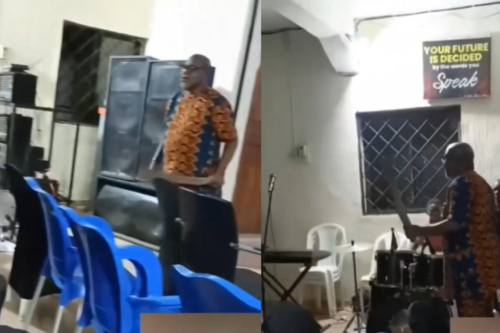“Gospel-secular Collabos Are Just Noise” — Mavis Asante Voices Strong Reservations Against Secular Collaborations (VIDEO)

Prominent Ghanaian gospel musician Mavis Asante has reiterated her firm stance against collaborations between gospel and secular artists, maintaining that her opinion on the matter remains unchanged. In a recent interview featured on the front page of Graphic Showbiz, Asante expressed her belief that such collaborations amount to “just noise and nothing else.”
Asante went on to question the purpose and intent behind these cross-genre musical partnerships, suggesting that they are often driven by fame, soul-winning (in a potentially misguided way), hype, or mere recognition, rather than a genuine artistic or spiritual synergy.
The “Onyame Ne M’aban” hitmaker articulated her conviction that gospel singers and secular artists operate within distinct callings and purposes. She argued that collaborations between the two could potentially create confusion and ultimately dilute the core message of gospel music.
To further illustrate her point, Asante drew a compelling analogy, comparing the collaboration between gospel and secular musicians to a scenario where a lawyer attempts to perform surgery or a surgeon defends someone in court. She asserted that just as these professions require distinct areas of expertise, gospel singers and secular artists should primarily focus on their respective domains.
Asante’s outspoken statement has already ignited discussions across both old and new media platforms, with some individuals agreeing with her perspective and others expressing disagreement.The topic was further explored during Peace FM’s flagship entertainment show, Entertainment Review, where Mavis Asante joined host Mc Yaa Yeboah to elaborate on the reasons behind her strong position.
While Asante’s firm stance has undoubtedly generated controversy, it has also sparked a necessary conversation within the Ghanaian music industry regarding the impact and purpose of such collaborations on the gospel message.During the same discussion on Entertainment Review, entertainment pundit Tilly Akua Nipaa offered a contrasting viewpoint.
She expressed her disagreement with Asante’s position, suggesting that Asante’s comments stemmed from a lack of understanding. Nipaa pointed out that in Ghana and many parts of the world, secular sound engineers often produce gospel songs, and secular songwriters have even been credited with writing and producing classic gospel songs sung by secular vocalists.
She posed the pertinent question, “If a secular artist can write a song for gospel singers, what makes their singing together a noise?”
Watch The Video Below












Leave a Reply